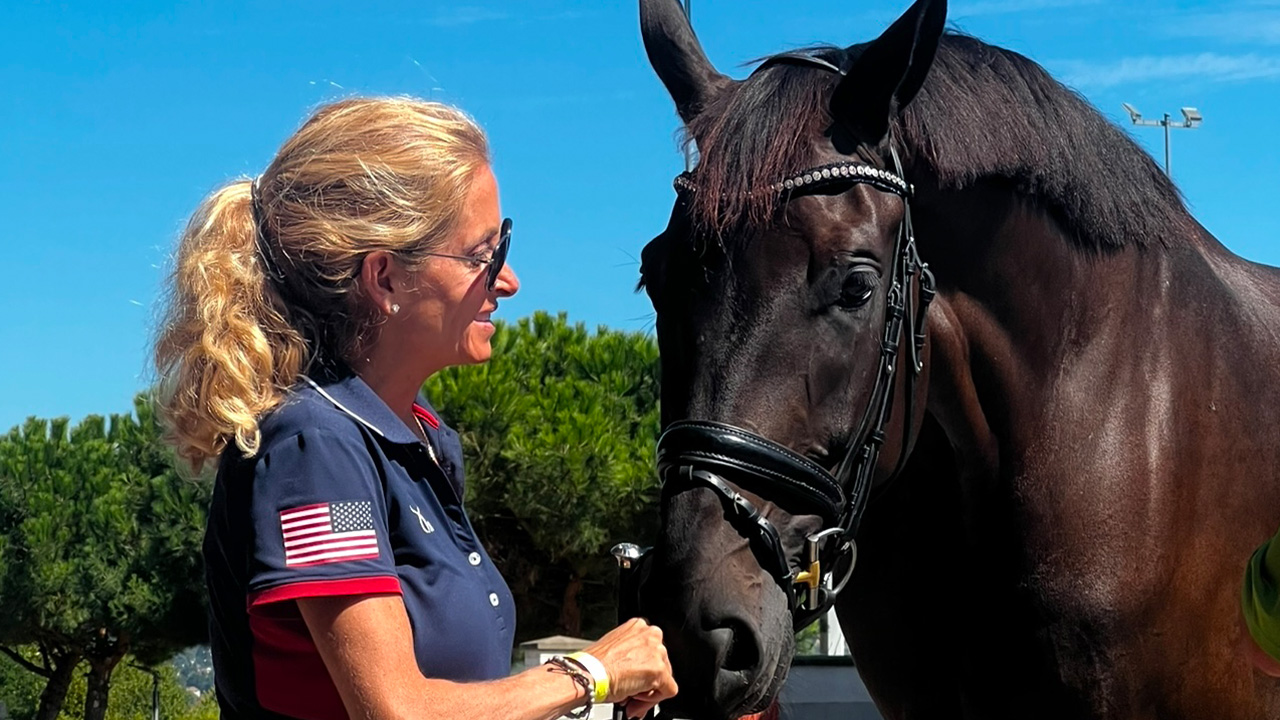content body
Picture this: The Palace of Versailles as your backdrop. Explosive cheering in the stands. And the shine of gold, silver and bronze medals around the necks of some of the world’s greatest athletes.
This is exactly where Dr. Kim Snyder, a 1998 graduate of Auburn University, found herself this past September as the team veterinarian for the 2024 Paris Paralympic Games.
“It is humbling and amazing,” said Snyder. “These athletes have smiles on their faces and are working hard, which makes you want to work even harder. It’s a job, but I do not consider it a job.”
Auburn shapes avid equestrian’s career
Auburn was home to Snyder for almost 12 years. She earned her undergraduate degree in animal and dairy science - pre-veterinary medicine from the College of Agriculture, and as an avid equestrian with equine-based desires, she went on to the College of Veterinary Medicine to pursue a Doctor of Veterinary Medicine (DVM) degree.
Snyder credits Auburn with helping her develop a strong knowledge base to support her future professional pursuits. Following graduation, she joined a referral practice in Wellington, Florida, until the arrival of tripletsons encouraged her to open her own equine sports medicine practice, Kimberly D. Snyder, DVM, PA.
“My practice focuses on dressage and jumping, primarily,” said Snyder. “The elite of the elite of horses compete in my area from November through May.”
Snyder also works as a Fédération Equestre Internationale (FEI) Vet Delegate, monitoring the well-being of horses during competitions.
Joining the Paralympic team
The previous Paralympic team vet, Dr. Meg Mullen, was a good friend of Synder’s with whom she worked many FEI competitions. Sadly, she died in a polo accident.
“I always had a soft spot for para-equestrians, and I was up for the challenge when approached about the position,” said Snyder. “I may not have sought the position; however, I took it on willingly, and I am thankful because it was a great experience.”
Paralympic equestrians undergo the same rigorous training as Olympic athletes and must compete at national and international competitions to earn their positions on the team.
Snyder had to quickly familiarize herself with the rider-horse combinations, not only reviewing the horses’ medical history but also learning about the riders and their conditions. She conducted farm visits to encourage the rider, athlete private vets and the horse to feel comfortable around her and confident in her skills.
“You want the riders to be open with you on what is going on with the animals,” Snyder said.
“Many rider and horse combinations have private vets; however, at U.S. international competitions, you are the liaison for the private vet — you are calling the shots.”
The winding path to Paris
In getting to know the rider-horse combinations who were potential Paralympic contenders, Snyder traveled to Tryon, North Carolina; Ocala, Florida; and Hagen, Germany, to observe competitions.
After she and the team coach Michel Assouline met with the Selecting Committee, the Paris team was named in June 2024. Three athletes and one reserve athlete were selected, and Snyder started to work with the riders, horses and personal vets, as well as with the horse owners, the riders’ personal coaches and the U.S. Team Coach.
“Communication is key to make the rider-horse combination feel comfortable,” said Snyder. “You want to let them know you are working as a team.”
From paperwork to biosecurity, international travel to the Games for both riders and horses was no small feat. In fact, U.S. teams have an added level of security due to the competitive level at which they compete.
Valient at Versailles
The team trained at a private farm in Vernouillet for two weeks prior to the games, hosting mock events, before arriving onsite for the Paralympics, which was “unbelievable with the Palace of Versailles in the background.”
As the team vet, Snyder was there to offer veterinary support and human athlete support.
“You are prepared for the worst, and you hope you do not have a lot of veterinary work,” she said. “You are there to support the team , and if any emergencies occur, you take care of the situation.”
In reality, it is all hands on deck — Snyder did everything from helping load trunks to grooming horses to decorating the wheelchairs for opening ceremonies to supporting the team both “psychologically and physically.”
The 2024 U.S. Paralympic Para Dressage Team consisted of four rider-horse combinations, three experienced and one newcomer.
And boy, did they perform. The team earned the highest score ever noted in the Paralympics, and individual achievements were impressive:
- Rebecca Hart and horse Floratina earned three gold medals.
- Roxanne Trunnel and horse Fan Tastico H earned gold, silver and bronze medals.
- Kate Shoemaker and horse Vianne earned a silver medal.
- First-time Paraolympian Fionna Howard and horse Diamond Dunes earned three gold medals.
“They came home with gold, gold, gold. They achieved unreal personal bests. They were floating. We are all still floating,” said Snyder.
An experience to remember
This wasn’t Snyder’s first Olympic experience. In 2021, she attended the Tokyo 2020 Olympic Games as part of the veterinary hospital team, but without fans, it was a different experience.
“When it came to Paris, it was a big change, a breath of fresh air. The stands were packed, and it was an electric atmosphere” she said.
“To see those three athletes get golds and their personal bests, especially for newbie Howard, there was an explosion in the stands. There was not a dry eye in the house,” Snyder said.
Equestrian is financially straining for organizers, but when the Paralympics produced those golds, they solidified their place as a Paralympics sport.
As for Snyder, she is already contracted — and ready — for Los Angeles 2028.









